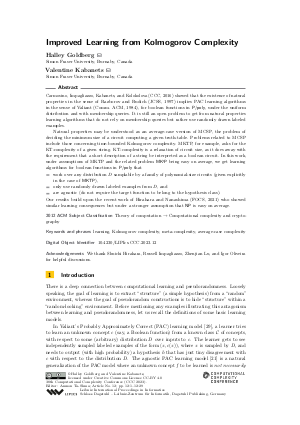@InProceedings{goldberg_et_al:LIPIcs.CCC.2023.12,
author = {Goldberg, Halley and Kabanets, Valentine},
title = {{Improved Learning from Kolmogorov Complexity}},
booktitle = {38th Computational Complexity Conference (CCC 2023)},
pages = {12:1--12:29},
series = {Leibniz International Proceedings in Informatics (LIPIcs)},
ISBN = {978-3-95977-282-2},
ISSN = {1868-8969},
year = {2023},
volume = {264},
editor = {Ta-Shma, Amnon},
publisher = {Schloss Dagstuhl -- Leibniz-Zentrum f{\"u}r Informatik},
address = {Dagstuhl, Germany},
URL = {https://drops.dagstuhl.de/entities/document/10.4230/LIPIcs.CCC.2023.12},
URN = {urn:nbn:de:0030-drops-182825},
doi = {10.4230/LIPIcs.CCC.2023.12},
annote = {Keywords: learning, Kolmogorov complexity, meta-complexity, average-case complexity}
}

 Creative Commons Attribution 4.0 International license
Creative Commons Attribution 4.0 International license

